- Home
- Michael Dobbs
The Touch of Innocents Page 20
The Touch of Innocents Read online
Page 20
‘All too often in such matters we’ve learned only long after the event of clandestine conditions and undertakings – bar-room deals which this House would never have accepted – well, it’s precisely why over the years Governments have been in the habit of making them clandestine. But is my Right Hon Friend aware that he won’t be forgiven if at a later stage we find out he’s dropped us in it, has deceived the House, if not by lying – no, God forbid any Minister should lie to this House – then at least by concealing the full truth?’
Devereux rose, turning a full 180 degrees where he stood to look directly at the Chairman. You miserable worthless East End excretion, he chanted inside, you sanctimonious little shit, he sang to himself, before smiling more broadly still and returning to lean on the Dispatch Box.
‘What can one say? On such occasions there is no evidence, no proof that can be offered to satisfy my Honourable Friend’s enquiry. All I can do is to tell him that I have examined every part of this project personally, studied every spigot and specification, read and rewritten every line of the relevant agreements, and then read them all again. I came rather late to this project, as he knows, but in all modesty I now regard this project as being my own. I can assure him that nothing has been hidden, and that everything has been considered. I can give him no proof of that which does not exist, I can only give him my considered and strongly held judgement, and my word of honour. I hope he will feel able to accept both.’
Devereux and the Duster. Or neither.
And with a short nod of consent from the now-sedentary Chairman, he was free. He had shown skill of both negotiation and explanation, and mastery of detail; it was an all too rare combination which had impressed even his enemies. And as editorial after laudatory editorial would confirm on the coming day, by cementing his own fate to that of the Duster he had made it probable that both would soar.
It did not need the Father of the House, the Member of Parliament with the longest period of continuous service, to rise unsteadily from his place below the central gangway in order to confirm Devereux’s personal victory, but nevertheless he did. The octogenarian caught Madam Speaker’s eye and the House hushed, out of respect and of necessity, to catch the quavering voice.
‘May I say to my Right Honourable Friend that I was a member of this House’ – the old man’s tongue ran across cracked lips as he pointed an unsteady finger – ‘when at an earlier time his father stood before that same Dispatch Box? He has done honour to his family’s name today. May I say – and I think I can say without any danger of contradiction – his father would have been well pleased with the way he has handled not only himself and his departmental brief, but also this House?’
Intended as a fulsome accolade, it was recognized as such by all around.
The words were still ringing in his ears as Devereux reached the privacy of his parliamentary office and hid behind the closed door, losing track of time and diary obligations as he stared, transfixed, into the lying eyes of his father.
‘Pleased? Are you pleased?’ he whispered. ‘How could you be? I’ve not only matched you, I’ve beaten you. I’ve won, don’t you see? Standing there, in your shoes, in your place. But not mocked and derided, not like you, not throwing it all away. At last I’m free, free of you. Rot in hell!’
There was no pleasure in the invective. No conviction, either. Somewhere within, a wire was cut. As he slumped into the chair at his desk and his watered eyes turned from father to ornately framed portrait of his daughter, he let out a fearful sob of despair. Because he could never escape his father. Chains beyond the grave.
Was it not his father who had instilled in the young Devereux the belief that women were objects to be used and if necessary abused, be they wife, housemaid, nanny or any other he met in an alcoholic fit? Who had stretched out his hand only to chastise? Who had deprived the son of any tolerable concept of family, of mother and father, of life within the walls of a home bound with love rather than barbed wire? Who had taught him to inflict sex as a matter of punishment rather than pleasure? And who thereby had led the son’s wife to despair and degradation, and ultimate suicide?
The family’s influence had ensured the inquest recorded a verdict of accidental death, a stumble on the cliff top, but Devereux knew better. She had walked with purpose, not so much jumped as been pushed.
By him.
By his father.
It had enabled Devereux to act out the role of gentle widower, loyally clinging to memories, but – God! – it was the memories which clung to him as leeches sucking blood and stifled any chance of normal human relationships and happiness. Behind the facade of public acclaim there was nothing, nothing but shame and suffering, utter loneliness, nothing but the hypocrisy of public esteem covering a private agony, the corrosive legacy of his father. Nothing.
Except for Paulette.
And it was through his beloved Paulette that Devereux knew he had not won, could never win. For he cared, cared too much, perhaps, had covered his eyes to her faults just as his determination to succeed may have covered his eyes to her needs. Her faults were his faults; she was the only thing he had, he could not blame her. Blame his father instead. Blame himself. Make any sacrifice, take any risk. So long as it might save Paulette. Whatever she had done.
As he held the photograph of his daughter in front of him, he could see reflected the image of his father and, in the reflection, distortion. The eyes carefully painted in sincerity seemed to glint with malice, the lips in smile now seemed to scorn, to shout that you have not beaten me! It is I who have beaten you! In the only thing you have ever cared about, the raising of your beloved daughter. You loved her as you have hated me, the only two sincere emotions of your life. Yet it is I, a womanizing drunk, a man in whom you could find no credit, who did a better job of raising you, miserable wretch that you are, than you have done your own daughter.
‘Look at her!’ the reflection seemed to cry. ‘You vowed you would never be like me, never lose your grip, would always be in control. Control!’ the image mocked. ‘You cannot even control your own daughter!’
A more worthless father than was ever his own. As the reflected image mocked, Devereux buried his face in the photograph of Paulette.
‘You bitch,’ he wept.
Children. She wondered what made them such a force. Objects so tiny, so weak and pathetic, yet of such irresistible might. Who, before they were born or even conceived, could bind together relationships. Or tear them apart. And whose tiny fingers somehow never let go, even from beyond the grave.
She might no longer be able to recall clearly what Bella looked like, but she could remember the smell, like malt, with a clinging pollen of sweet powder. She could not escape the smell, it was the scent of all young infants which seemed to linger in every place she went. In queues for taxis, amongst the clothes racks at Selfridges, at the cash till in Bally’s and in the corner of the coffee shop behind Marks & Spencer where they paused for breath during the effort of spending so much, so quickly. She would turn sharply as she caught a glimpse of a waddle that was Benjy’s or a tuft of red hair that was Bella, but always it was a deception, someone else. From the corner of an anxious mother’s eye all young children appeared the same.
The Stafford flowed over with English understatement; it all but cascaded down the Regency wallpaper and echoed from graceful cornices. Not an air-conditioning unit in sight. The entrance hall was diminutive, some might say cramped, scarcely a hotel foyer, redolent of a private house which, indeed, it once had been.
‘Just like home,’ Daniel muttered.
‘Yeah.’ She felt an ache. She no longer had a home, indeed it seemed as though she’d never had a home. Not since the day her father had been caught with his dental receptionist and the family had cracked and frozen like a pond in winter. As her own had now done. Seasons turned full circle.
They were greeted with dignity and discretion, if also with a half-raised eyebrow when it was indicated they intended to settle the b
ill with cash, but Mrs Franklyn was, after all, a foreigner, Canadian, and they did things differently. Anyway, they had booked in for two weeks rather than a couple of hours, they weren’t going to use the hotel as a knocking shop. The Stafford wasn’t like that. Here one had affairs, liaisons, arrangements, not leg-overs.
One guest, an American, now in her mid-sixties, had been coming every year for a week with a man nearly twenty years younger than herself, to occupy a room where with the window open one could hear the changing of the guard at Buckingham Palace, just across the park. The sound of the military band helped keep rhythm and maintain stamina. Percussive passion.
Daniel was not to be so lucky. They took a suite in the Carriage House mews to the rear. Cobbles. Character. And two beds, Daniel noted with a look of disgust. He took himself off to the bathroom as she sat and dialled.
‘Joe, it’s me. How’s Benjy? Did you get the letter I sent with him?’
It took a moment for him to respond, in a tone more conciliatory than she remembered. But why shouldn’t he be conciliatory, he had Benjy. He’d won – and in winning had discovered that looking after a child by himself could prove to be more of a social constraint than endemic halitosis. The free time, the orderly apartment, the periods of peace that had been his were no longer his own. Like trying to screw in front of spectators. Distraction. Constant interruption. The bitter-sweet fruits of victory had taken the edge off his aggression, leaving puzzlement.
‘What are you up to, woman? We’re in the middle of a custody battle and you send the kid back, free, gratis, no charge, with a note saying you’ll want him back later. One of us has tumbled out of our tree, and it sure ain’t me.’
‘I’m the mother of two children, Joe. Bella as well as Benjy. I had no choice.’
‘You had the choice of facing reality. Bella’s dead, Izzy.’ He groaned, genuine anguish. ‘Lord, I don’t want you to suffer without cause, really I don’t, but … Grubb called me yesterday, asked if you were back, were coming back. I know what’s going down there. You’ve thrown away your kid. You’ve thrown away your job. You’re throwing your whole world away, Izzy. You’ll have nothing. Nada.’
‘That’s not how I see it.’
Stubborn damn woman; still, it was her problem, at least he’d tried.
‘Is that how your new friend Danny – that’s his name, isn’t it? – is that how Danny sees it?’
She bit her lip. Benjy was obviously recovering his ability to talk, fast. At least it meant he must be comfortable. ‘How is Benjy?’
‘Fine, great. Staying at my sister’s while I sort things out. But you can forget him, Izzy. I don’t want to see you hurt any more, that’s not my objective, but there’s no way I’m giving him back and you’re gonna get creamed if you take this to court. The woman who lost one child and abandoned the other …’ An edge to his voice. ‘Off with a man who’s not her husband …’
And money that was not her own, she added silently.
‘… who doesn’t even have an income. It’s a real pissy mess. The lawyers’ll make hamburger out of you.’
He didn’t like this other man, a man whom his son talked about with smiles and affection. He felt the need to retaliate.
‘And me? Well, I’ve got a huge promotion on its way. The Duster’s really coming through and they’re giving me an extra piece of the action. More salary. More status. Security for Benjy, everything you can’t give. If you fight I’ve got the custody hearing sewn up tight as a duck’s ass.’
She didn’t respond; his analysis was persuasive.
‘Don’t fight, Izzy. Don’t hurt yourself more than you need. Stop running away from the truth.’
‘I’m running after the truth, Joe.’
‘What truth?’
‘I’m … not sure yet, but it stinks. Bella was taken, I’m sure. They’re all hiding something; the local police and press, the bank manager, the Coroner—’
‘And the American Embassy,’ he offered sarcastically.
‘Maybe them, too. Certainly Paul Devereux.’
‘You’re kidding,’ he stammered, incredulous, his head ringing with the sound of his future crashing in flames.
‘Daniel’s another journalist and he’s helping me track down—’
She failed to notice the changing tone, his feeling that she was accusing him of parental neglect, of lacking concern, that she was screwing around with his Duster. And it was a mistake to mention another man.
‘Stop! Stop this shit!’ he cried, male pride tangled with impatience. And remorse. He had to shut it out. He couldn’t accept any suggestion of Bella being alive; Bella was for him a corrosive mixture of guilt and personal failure, and Izzy its catalyst. ‘Why am I wasting my sympathy on you? This is no more than another one of your assignments. That’s it, and that’s all of it. Izzy Dean, correspondent extraordinaire. You don’t give a damn about the kids, only your story. You’re not a mother, just another half-baked journalist who can’t hear breaking wind without smelling a conspiracy. Who’d pass up on anything for an exclusive – her marriage, even her kids.’
‘There is a story here, a huge one.’
‘Get off this nonsense, get real, woman. Get laid for all I care. But just get out of my life.’
‘Joe, I’m serious.’
‘Me, too. Damn you. So see you in court.’
Then the phone went dead.
She stared at the receiver in her hand for long moments until it started to warble in complaint, as though offering her warning – Danger! Go no further! Do not proceed beyond this point.
She silenced it, slowly held it up again, and redialled.
Connection. Response. A woman’s voice.
‘Hello. My name is Fiona Franklyn. I’d like to talk with Mr Gideon Fauld, please.’
Daniel came into the room naked to the waist. There was no flesh on him, just sinew, muscle, unblemished skin – never Mr Universe, but … young. She tried not to look too hard, to notice the firmness, the dark brown nipples, the ripples of tightness across his abdomen, waist so much narrower than his shoulders – territory which with Joe had been not so much forbidden as forgotten – all capped by an irreverent grin and cascade of freshly washed hair which he was towelling dry. As the towel flapped back and forth, the action presented his torso like a well-tuned keyboard begging to be played, to have hands laid upon it.
Pity. A waste. Like a vegetarian at a lobster bake.
She tried to disguise her attention by adjusting her hair in a mirror, but he had already noticed her furtive stare.
‘It’s not just physical, you know.’
‘What?’
‘You. For me. I want you to know that. I feel very strongly about you.’
‘Thanks.’ She looked sheepish, out of practice at dealing with sincere emotions. ‘It’s on. Tomorrow afternoon. Around twelve thirty,’ she added, changing the subject.
‘Fauld? That’s great,’ Daniel responded. ‘At least, I suppose it’s great. How do you reckon we handle him?’
‘We don’t handle him. I do it. On my own.’
‘No way.’
‘The only way.’
He looked hurt. ‘Impossible. I’m there. We go as a team. A couple.’
‘A rather odd couple, don’t you think?’
‘Why, for God’s sake?’
‘Our nationalities. Our ages, for a start.’
‘Are you trying to suggest you and I would be unnatural or something?’
‘Daniel, you don’t even know whether I take sugar in my coffee. Or even if I take coffee. We don’t have the right body language for a married couple. He might spot the deception in a hundred different ways. We can’t afford the risk: I’ve got to go alone.’
He took this badly. The towel flew angrily across the room and sulked in a corner. ‘Don’t start shutting me out. Don’t take it out on me just because I asked you to go to bed.’
‘No, Daniel. You’ve got it all wrong. You didn’t insult or offend me, I was … flattere
d.’ And flustered.
His scowl remained distinctly sceptical.
‘Daniel, take your mental processes out of your underwear and put them back where they belong. Fauld runs an adoption agency. So we talk to him about adoption. Babies. I’m a foreigner. But if I take you along and pretend we’re just another happily married couple, even if you know everything about me, how on earth do we explain why we’ve come more than three thousand miles just to adopt? Why not do it back home, on our own doorstep? No, if I’m to get him talking, trying to find the wrinkles in his operation, I’ve got to pretend that there’s something wrong with me. Some reason why I can’t adopt legitimately. A medical problem. A criminal record.’
‘Perhaps you could suggest you’re too old,’ he offered sullenly.
‘Thanks a bunch!’ She was about to laugh until she realized he might have a point. The laughter drowned in a minor panic tremor. ‘I go on my own. A single woman. With some reason why no legitimate adoption agency in the world will look twice at me. Daniel, it will be much more convincing if I’m on my own. You recognize that, don’t you?’
‘And much more dangerous.’
‘How do you figure that?’
He sat on the edge of the bed. ‘Look, Izzy, I hadn’t wanted to ram the point home but … If Paulette Devereux is an addict, she won’t have been working at the Mission out of charitable instinct. Addicts need supplies, supplies cost money. Lots of it. She will have found some way of making money, a large amount of it, out of the Mission. And the only asset the Mission has is the babies. Like Bella.’
‘What are you trying to say?’
‘Bella could have been sold.’
‘You think that’s possible?’
‘I think it’s probable.’
‘Sold? For adoption,’ she whispered, the tone begging reassurance.
‘Presumably.’ But he had hesitated, his eyes dropped, the response lacking conviction.
Fear seemed to have stopped her heart, fear of the unknown. She walked across the room as though in physical pain and sank down on the edge of the bed beside him. She stared blankly at the wall, suddenly wanting to hear lies, not wanting to confront the truth she knew she would find in his eyes.

 Last Man to Die
Last Man to Die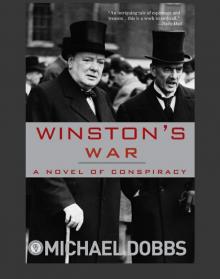 Winston's War
Winston's War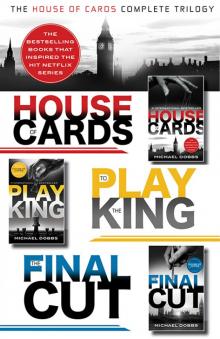 The House of Cards Complete Trilogy
The House of Cards Complete Trilogy Saboteurs
Saboteurs The Touch of Innocents
The Touch of Innocents WC02 - Never Surrender
WC02 - Never Surrender Old Enemies
Old Enemies Churchill's Triumph
Churchill's Triumph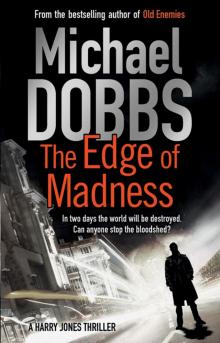 The Edge of Madness
The Edge of Madness Goodfellowe MP
Goodfellowe MP The Final Cut
The Final Cut Whispers of Betrayal
Whispers of Betrayal Churchill's Hour
Churchill's Hour The Buddha of Brewer Street
The Buddha of Brewer Street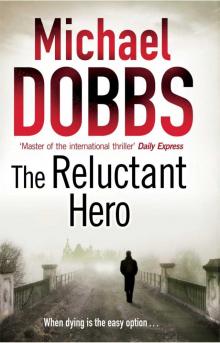 The Reluctant Hero
The Reluctant Hero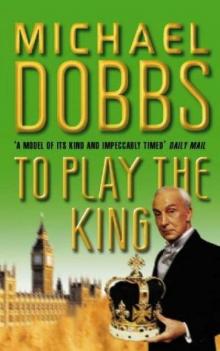 To Play the King
To Play the King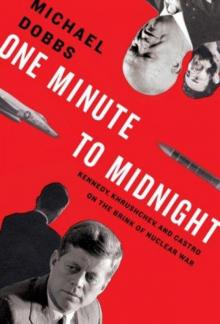 One minute to midnight
One minute to midnight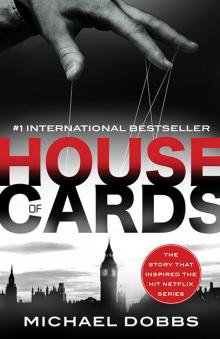 House of Cards
House of Cards The Lords' Day (retail)
The Lords' Day (retail)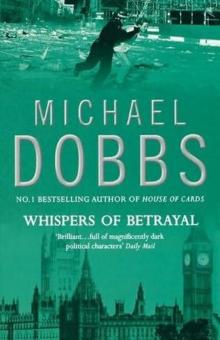 Whispers of betrayal tg-3
Whispers of betrayal tg-3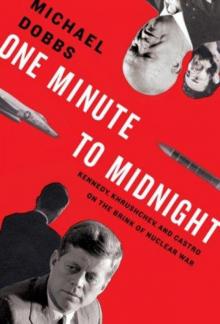 One minute to midnight: Kennedy, Khrushchev, and Castro on the brink of nuclear war
One minute to midnight: Kennedy, Khrushchev, and Castro on the brink of nuclear war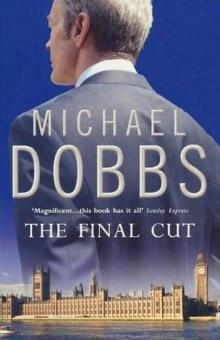 The Final Cut fu-3
The Final Cut fu-3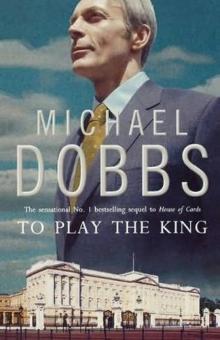 To play the king fu-2
To play the king fu-2 A Ghost at the Door
A Ghost at the Door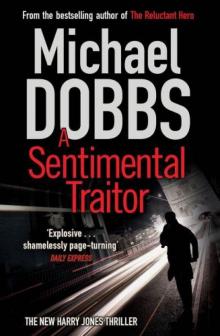 A Sentimental Traitor
A Sentimental Traitor